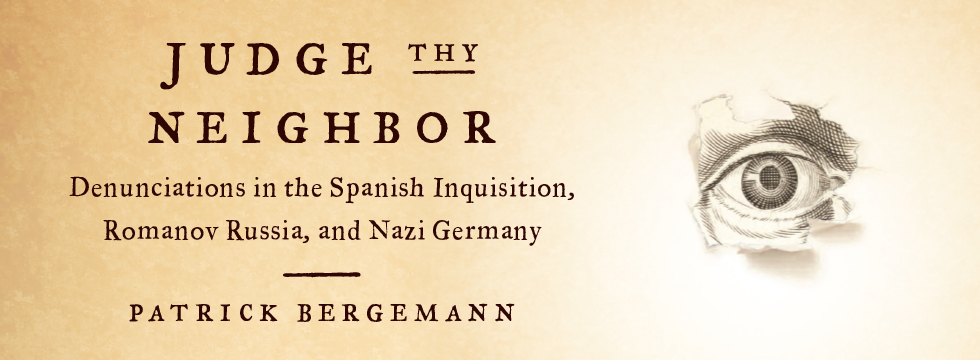Q&A: Patrick Bergemann on Judge Thy Neighbor

“Social scientists neglect negative interpersonal ties. While lab experiments on the willing assumption of malevolent authority open a window on this topic, Bergemann is the first to examine betrayal and denunciation to the authorities in natural settings, and to theorize the common causes and patterns over the centuries. A fascinating opening into a dark side of human behavior.”
~ Mark Granovetter, Joan Butler Ford Professor, Stanford University
This week we are featuring Judge Thy Neighbor: Denunciations in the Spanish Inquisition, Romanov Russia, and Nazi Germany, by Patrick Bergemann. In this Q & A, Bergemann discusses the purpose and sometimes unexpected uses of denunciation in maintaining political power as well as furthering personal gain. With examples from various settings such as Nazi Germany, Romanov Russia, and the Spanish Inquisition, Bergemann traces the course of denunciation throughout history. He then outlines the role of denunciation in modern society, where it plays an important role in crime reporting, plea bargains, whistleblowing, and counterterrorism efforts.
Enter our drawing for you chance to win a copy of the book!
• • • • • •
Q: What exactly are denunciations and why are they important?
Patrick Bergemann: Although the term “denunciation” is not often used, denunciations are all around us. Denunciations are reports of wrongdoing made to the authorities by a person or persons and are more commonly referred to as snitching, whistleblowing, tattling, and ratting. Most simply, they are reports of criminal behavior by witnesses. Denunciations are important because societies rely on the reporting of wrongdoing in order to maintain order, yet there is often pressure on individuals by other community members not to report (hence the negative connotation of words like “snitching” and “ratting”). Given this, I seek to understand why in some settings denunciations are incredibly common. What is it about those settings that facilitate the reporting of others and why do so many people come forward?
Q: You mention how denunciations in specific settings and communities can be quite common, which is unexpected due to the negative connotation of the word itself. What kinds of settings “prompt” this embrace? From your research, have you found any commonalities that would link these settings together?
PB: I discovered that institutional structure is extremely important, and by this I mean the ways in which authorities facilitate and encourage denunciations. In some settings there is strong pressure put on people to denounce others. A relatively mild version of this is an offer of a reward, while an extreme version is physical torture. In these settings, individuals largely come forward in response to these direct incentives, so as to gain rewards or avoid punishment.
However, in other settings there are widespread denunciations but no incentives put in place by the authorities. Motivation in these settings is much more puzzling. What I found is that individuals here denounce for an entirely different reason. They use denunciations as a means of resolving private disputes or grudges, in order to harm another individual. These become especially prevalent under two conditions: when authorities make it particularly easy to report denunciations and when they presume the guilt of the people denounced. Oftentimes this also leads to false denunciations, when an individual wants to harm someone else and fabricates a crime.
Across the three settings that I studied in depth (the Spanish Inquisition, Romanov Russia, and Nazi Germany), along with others that I mention in the book, I found these two patterns repeating again and again.
Q: The second instance of denunciation, which stems from a place of personal motives and spitefulness, seems to capitalize on the state’s overeagerness to monitor and control the populace. Can you tell us some examples of this type of denunciation?
PB: One example that always comes to my mind took place in Nazi Germany in 1939. On September 9, 17-year-old Anna Reising was denounced for receiving visits from a “suspicious man,” which in that context meant someone who was Jewish. Upon investigation, the Gestapo determined that the man was not suspicious at all, but was Anna’s boyfriend. They discovered that the whole thing was actually about a toilet. The denouncers were upset that they had to share their toilet with other tenants in the building (including Anna and her family) and had been plotting revenge ever since.
A second example comes from Russia in the 1600s. On February 9, 1649, Kondrashka Kozhukhov and his cousin Vas’ka were drinking together when Kondrashka made a disparaging remark about Vas’ka’s father. An argument ensued that led to one of the cousins falsely denouncing the other for insulting the tsar. The cousins continued to argue with one another throughout the official’s investigation until he finally threw them in jail to sober up. Six days later they both returned with a petition claiming that they had reconciled and begging the official’s forgiveness.
A third example come from the Spanish Inquisition in 1502. On January 4, Juana García of Aranda denounced the cleric Diego Mexías for making the heretical statement four years previously that there is no “paradise or hell, nor anything to believe besides birth and death and men getting what they desire.” She subsequently mentioned that she was recently mistreated by Diego and his brother and his uncle. Although less evidence survives in this instance than in the other two examples, it is likely that Diego’s family’s maltreatment of Juana contributed to her decision to denounce him for a previous transgression.
Q: Does this type of denunciation not undermine and falsify the system authorities aim to keep in place? Do authorities not realize people are co-opting denunciations for their own purposes?
PB: It would seem that authorities would do their best to dissuade individuals from wasting investigatory resources with petty and false complaints. In Nazi Germany the authorities were well aware that denunciations were being misused. Hitler himself complained that “We are living at present in a sea of denunciations and human meanness.” Yet despite frequent complaints, Nazi officials ultimately did nothing to change the system. This is because denunciations provided valuable information, even if some of the reports were false. Furthermore, widespread denunciations provided other benefits. They reinforced the authorities’ legitimacy to investigate and adjudicate complaints, and they fostered hierarchical bonds between authorities and citizens. The Nazis were concerned that punishing false denouncers would dissuade everyone from reporting, and imperfect benefits were perceived as more valuable than no benefits at all.
Q: How do these types of settings relate to modern society? What can they tell us about the present use of denunciations?
PB: In the final chapter of the book, I connect the historical cases to the present day. Denunciations are also prevalent in modern society. Examples include the reporting of crimes, plea bargains, whistleblowing, and counterterrorism efforts. Across all of these, it is possible to see elements of both types of denouncing: reporting to gain rewards or to prevent punishment from the authorities, and reporting to harm one’s neighbors. For example, although whistleblowing is often thought to be altruistic, there is evidence that it is frequently motivated by the hope of rewards or by the desire to get back at disliked colleagues. Similarly, individuals in police custody sometimes provide false testimony against others in order to lessen their own sentences. By understanding these dynamics, we can better design institutions that encourage the reporting of useful denunciations (e.g. true reports about serious crimes), while dissuading the petty and false denunciations that were so prevalent in the past.








